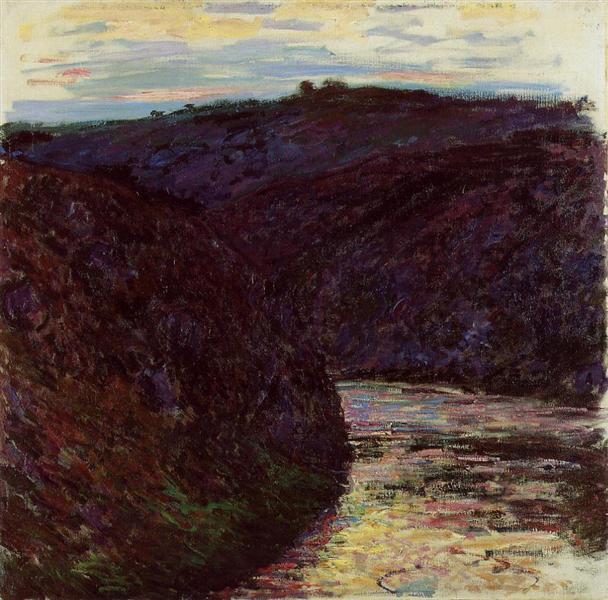Descrizione
The painting "Valle du Creuse - 1889" by Claude Monet is a fascinating testament to the artist's mastery of light and colour in his constant quest to capture the essence of nature. Monet, one of the leading exponents of Impressionism, delves into a landscape that reveals his ability to transform the everyday into something sublime. The Creuse Valley, a picturesque region in the province of Creuse, France, was a recurring place of inspiration for Monet, who had found in its landscapes an inexhaustible source of beauty.
In this work, Monet employs an approach characteristic of the Impressionists, where the use of colour and rapid brushstrokes are used to evoke the atmosphere of the moment rather than faithfully depicting every detail. The composition is dominated by a series of hills emerging in the background, while the foreground features a river winding through the landscape. The predominant shades of blue and green are interrupted by splashes of warmer, more vibrant colour, providing a balance that keeps the viewer's eye constantly moving across the canvas.
The quality of light in “Valle du Creuse” is a key feature that deserves special attention. Monet was a master at depicting natural light, and in this work one can observe how the reflections of the water capture the tones of the sky, creating a symbiosis between aquatic and terrestrial elements. The play of light and shadow suggests the time of day, evoking a sense of calm and contemplation. The brushstrokes, mostly short and loose, contribute to this sense of immediacy and spontaneity, fundamental characteristics of the Impressionist style.
As for the characters, the painting is devoid of human figures, allowing the viewer to focus on the magnificence of the landscape itself. This absence of humanity can be interpreted as Monet's desire to connect the viewer with nature in its purest and most elemental form. By removing any personal distractions, the artist seemingly invites deeper reflection on the relationship between humans and their environment.
An interesting aspect of “Valle du Creuse” is the context in which it was created. Painted in 1889, a period when Monet had already solidified his reputation within the Impressionist movement, this work can be seen as a culmination of his experiments with color and light developed throughout his career. Personal reflections and contemplation of his artistic evolution over time are evident in every brushstroke and every color choice.
It is also relevant to mention that the landscape of the Creuse Valley was a source of inspiration for other contemporary artists, and Monet approaches it with a sensitivity that distinguishes him. The choice of location, the use of light, and the composition evoke a sense of peace and serenity, characteristics that have made this work a paradigmatic example of Impressionism.
"Valle du Creuse" is not only a beautiful landscape, but a work that invites contemplation and admiration for the sublime nature, showing Claude Monet's mastery in every detail. Thus, the work stands as a milestone within Impressionism, consolidating the legacy of an artist who, through his unique vision, continued to transform the perception of art and nature.
KUADROS ©, a famous painting on your wall.
Hand-made oil painting reproductions, with the quality of professional artists and the distinctive seal of KUADROS ©.
Painting reproduction service with satisfaction guarantee. If you are not completely satisfied with the replica of your painting, we will refund 100% of your money.

